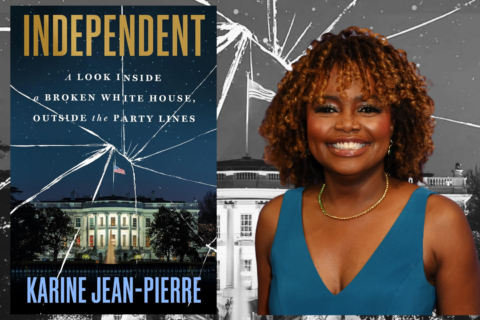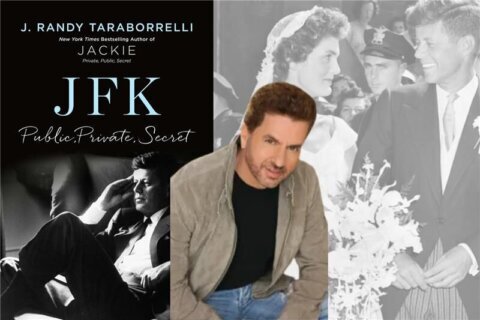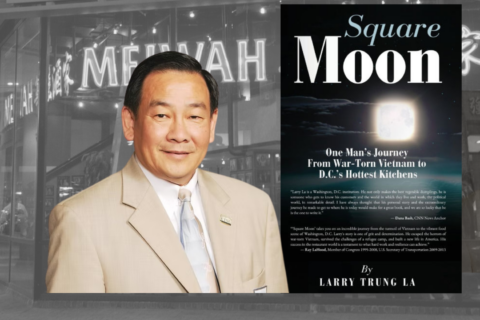New York Times-bestselling author Larry Tye offers a captivating new work titled “The Jazzmen: How Duke Ellington, Louis Armstrong and Count Basie Transformed America.”
This video is no longer available.
The book explores the intimate lives and historic musical legacies of Duke Ellington, Louis Armstrong, and Count Basie — three titans of jazz who not only advanced jazz as America’s most original musical art form but overcame the oppressive racial barriers of their time and, as Tye puts it, “set the table for Brown vs. Board of Education integrating public schools, which is now 70 years old
“Nobody needs to be told that these three played extraordinary music,” Tye told the WTOP Book Report in a recent interview.
“But they help set the table or write the soundtrack for the civil rights revolution. Don’t believe me, believe Martin Luther King who said they set the table (for Brown v. Board).”
“The Jazzmen” is a careful balance between an up-close personal narrative and a historical record of these three pivotal figures, their musical achievements and their impact on American society.
Duke Ellington, born Edward Kennedy Ellington in D.C., was the grandson of slaves.
His sophisticated style and innovative compositions transcended musical categories, earning him global acclaim and, according to Tye, “D.C. was essential to what Duke Ellington became. He was incredibly confident, and that confidence came from coming from the biggest and arguably the most affluent Black community in America, which was Washington, D.C. at that time.”

Louis Armstrong, emerged from the tough streets of New Orleans known as The Battlefield, “and yet it was his artistry that opened America’s ears and souls to the magnificence of his music and to Black humanity.”
Count Basie, the son of a coachman and laundress, was “secretive in a way that neither of the other two was” according to Tye, and forged a path to fame by forming one of the most celebrated big bands in history.

A promise to the porters
The impetus for writing “The Jazzmen” was a promise that Tye made to subjects from his past.
“I wrote a book 20 years ago on (The Pullman Porters), these extraordinary guys,” Tye recalled. “And they made me promise that someday I would write two books. One was on their favorite athlete, Satchel Paige, and the other was on their three all-time favorite passengers: Ellington, Armstrong and Basie.”
The book details how Pullman porters ensured the musicians’ safety and comfort during travels in the segregated South.
“These guys would do their concerts and afterward they would head back to their Pullman sleeping car, knowing they had a great meal waiting for them,” said Tye.
“Pullman porters would keep them safe. And in return, they did something amazing: They held a private jam session in the middle of the night, just for the Pullman porters.”
Tye’s research for “The Jazzmen” was comprehensive, based on over 250 interviews with musicians (Wynton Marsalis, Jon Batiste, Sonny Rollins), political figures (former President Bill Clinton), and those who knew Ellington, Armstrong, and Basie personally.
“So this brings them to life in a very vivid, personal and accessible way,” Tye said.

Imperfect heroes
“The Jazzmen” also doesn’t shy away from discussing the imperfections and complexities of these men.
Tye pointed out instances of misogyny within the jazz world and among the three protagonists themselves, affecting female musicians who often faced the double-whammy of racial and gender discrimination.
“Vocalist was about as high as most women could rise in this band,” says Tye, “(they) were called ‘canaries.’ They were called ‘thrushes.’ They were demeaned in a way that was just extraordinary.”
The author is quick to note that there was one exception: Lilian Hardin Armstrong, “Louis Armstrong’s second wife and the one who, I think, catapulted him to greatness.”
Another shared trait among the three was what Tye said was “definite competition” between the men.
“None of them liked sharing the spotlight with anyone else, which is why they played together so rarely,” he said.
Asked to reflect on the lessons today’s musicians can learn from these jazz giants with “The Jazzmen” arriving in age of winner-take-all brawls in popular music, Lye contended: “The jazz men of that era showed that we can work together … not just to make ourselves commercial successes, but we can work together to strike at the Jim Crow laws of the era that kept them down.”
Whatever their flaws, Tye’s portrayal of Ellington, Armstrong and Basie is one of admiration for their artistry and their contributions to racial progress.
Tye emphasized that is not just a tale strictly for jazz enthusiasts; it’s a vibrant piece of history that resonates with themes of social justice, artistic innovation, and the enduring power of music.
As Tye concluded: “If you want a rip-roaring story that will have your toes tapping and your mind thinking about everything from racial justice to the magnificence of music, this is the book for you.”
Larry Tye will be discussing “The Jazzmen” at Politics and Prose bookstore at D.C.’s Cleveland Park Library on Tuesday, May 21 at 6:30 p.m. in conversation with WAMU’s Rob Bamberger, and at Busboys and Poets in Brookland on Wednesday, May 22 at 6 p.m. in conversation with WPFW Morning Brew — Classic Jazz Edition producer host Craig Williams.
Get breaking news and daily headlines delivered to your email inbox by signing up here.
© 2024 WTOP. All Rights Reserved. This website is not intended for users located within the European Economic Area.








